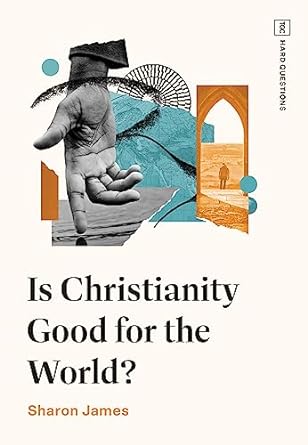A Book Review from Books At a Glance
by Daniel L. Arter
Is Christianity Good for the World? by Sharon James is part of The Gospel Coalition’s Hard Questions series, which is a series of small booklets intended to answer common questions about Christianity that are difficult to deal with. In particular, The Gospel Coalition intends for these booklets to be for unbelievers who are searching but have yet to buy into confessional and orthodox Christianity. James is a social policy analyst, which makes her uniquely suited to provide an apology for Christianity pertaining to its goodness in the world. It is a booklet, so it is rather short, but it does provide decent apologetic argumentation for the question at hand—is Christianity actually good for the world?
Due to the booklet’s short size, there are no chapters, but it is divided into three major sections—the first concerning freedom (4-15), the second concerning flourishing (15-29), and the third concerning fulfillment (29-39). James then breaks each major section into smaller sections in which she expounds on how Christianity has influenced the particular areas of freedom and flourishing.
In this booklet, James argues that without the teachings of Christianity, the world would have a deficient view of both human freedom and human flourishing. She starts her segment concerning freedom with the poignant statement that the West takes for granted freedom and the intrinsic worth or value of the individual, but these ideas are not common worldwide, nor have they always been common (4). Rather, James argues that the very concept of human freedom stems from Christian ideology and doctrine. It is notable that in her section concerning freedom and slavery, there is no mention of slaveholders who utilized Christianity as justification for slavery (10-12). In the segment concerning flourishing, James speaks of compassion and stewardship as significant reasons for Christians to help in the process of human flourishing—Christians seek human flourishing because of their desire to show compassion and steward what God has created. James suggests that the state of society today and its shift from a culture of life to a culture of death is the result of rejecting Christianity’s teachings (26-29). The final segment on fulfillment then ends the booklet by pointing out the lack of fulfillment found in a post-Christian world (30-31). The author explains that God’s plan for mankind is the only place that true fulfillment can be found (31-33) and anything apart from God’s plan for mankind only results in a lack of fulfillment.
Is Christianity Good for the World? provides a brief argument for the inherent goodness found in Christianity and its teachings. While a lot more could be said concerning the topic and a lot more could be disseminated about the different sections within the booklet, what James offers is a brief, but sufficient argument for the goodness of Christianity for the world and she shows what a lack of Christian thinking does to society as a whole. Is Christianity Good for the World? provides a simple response to an important question for those seeking to defend Christianity from accusations against Christianity’s moral value.
Daniel L. Arter
